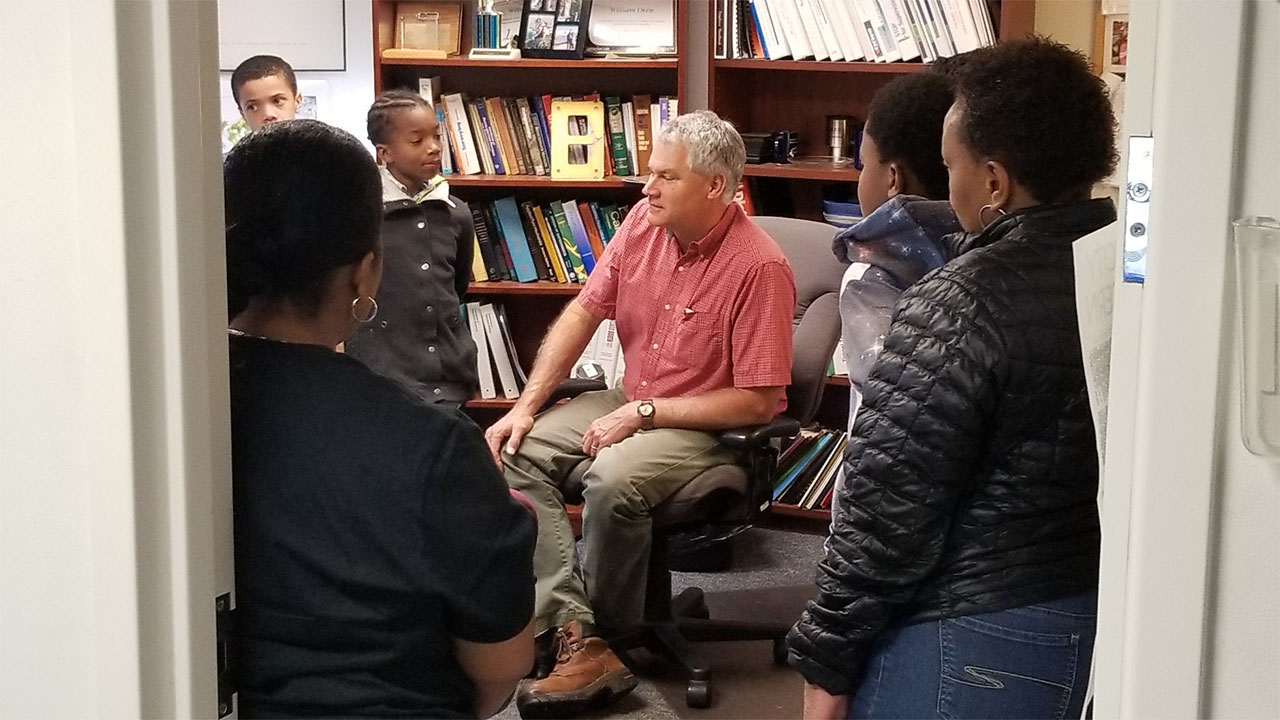Engineering Division Manager, Will Oren, speaks to a group of students during a BEAMS role model mentorship session in his office.
More Than 1,300 Students in Newport News Will Participate in the BEAMS (Becoming Enthusiastic About Math and Science) program at Jefferson Lab
A group of fifth graders eyed Jefferson Lab Science Education Administrator Steve Gagnon. He stood unassuming and patient at the front of the lab auditorium, ready to begin the Cryogenics Show. Behind him was a complex mix full of common house hold items (including a tea kettle) and science equipment (such as glass tubes) scattered and seemingly disorganized across a long table.
Gagnon introduced himself and nonchalantly grabbed a large silver cannister with what appeared to be smoke billowing out of it. Admittedly, the students were mostly disinterested, slouched in their seats. Disinterested that is, until Gagnon informed the students the smoke was not smoke at all, but fog caused by the element liquid nitrogen. As he began to discuss the contents of the container, laying out the safety rules, he accidentally-on-purpose spilled what was inside. As the liquid nitrogen sloshed out and cascaded onto the table and disappeared into the floor, the students straightened up. Eyes grew wide. Gagnon had their attention.
The Cryogenics Show is one of three parts of the Jefferson Lab BEAMS program. BEAMS – short for Becoming Enthusiastic About Math and Science – was born in 1991 out of the desire to showcase fifth and sixth grade students’ real-life applications of STEM (Science, Technology, Engineering and Mathematics) learning. The BEAMS program brings the students to Jefferson Lab for interactions with lab staff via science- and math-based activities. The immersive multiday course is designed to harness a student’s love for STEM learning early in their education.
“It’s exciting to see students make connections between their daily lives and the principles of STEM education,” says Lisa Surles-Law, Science Education Team Lead for Jefferson Lab.
After the Cryogenics Show, where Gagnon highlights some of the ways the lab uses temperature controls to perform its science, the students enjoy some lunch before diving into the scheduled classroom activities. The activities are experiment-based and led by Carol McKisson and Rhonda Bell – who have collectively taught students for 40 years. The classes range from building a small boat to experimenting with magnets to making “oobleck,” more commonly known as slime. The lesson-based portion of BEAMS focuses on the state-wide Standards of Learning (SOL) program initiatives, with each activity requiring teamwork, critical thinking and scientific exploration.
“Inspiring students to take an interest in STEM at an early point in their academic career is vital to their long-term confidence in the field and their career choices,” Surles-Law explains.
The two primary goals of the BEAMS program are to:
- Spark an interest and pathway for minorities and females to the STEM field early in their education.
- Strengthen the motivation and academic preparation of students so they graduate from high school as scientifically literate citizens ready for further education or a career.
The third component of BEAMS is the role model session. Students gather in an employee’s office or conference room for a Q&A session with a lab employee. The 15-minute session kicks off with the role model providing students an overview of what they do at the lab. The role models may range from scientists, engineers, communicators and more. This gives students an opportunity to see how many of the subjects they learn in school can be used in combination for careers in the future.
“It’s important for these students to understand the career possibilities that are open to them even if they aren’t seeing them modeled directly in their day-to-day lives,” Surles-Law explains.
Back in the auditorium, Gagnon holds up two carnations. “I need a volunteer,” he said. Nearly every single hand went up. It was clear the name BEAMS – Becoming Enthusiastic About Math and Science – lived up to the hype.
To learn more about the BEAMS program at Jefferson Lab, click here.
Contact: Rebecca Duckett, duckett@jlab.org or (757) 269-6809


